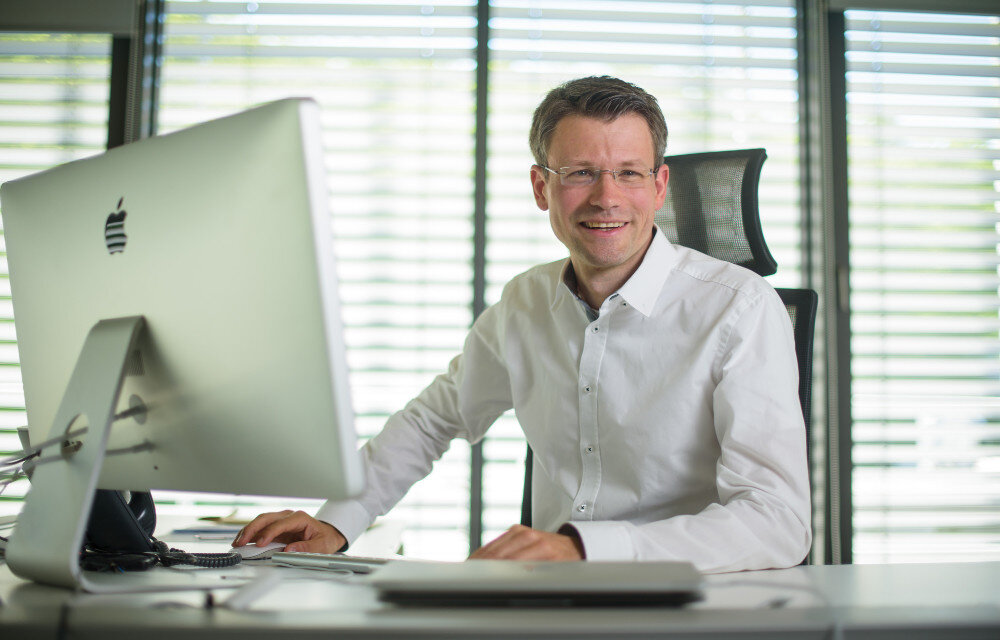Bioinformaticians decode protein that can reverse declining cognitive performance in old age

Bioinformatics Professor Andreas Keller. Photo: Oliver Dietze
In old age, memory performance declines in most people, often to such an extent that this massively affects their everyday life. In a joint study with Stanford University, bioinformaticians at Saarland University have now identified a protein with a rejuvenating effect that influences the process of declining brain performance in old age. Their research findings were published in the journal Nature. The New York Times also reported.
There are many causes of age-related diseases – and they often lead to considerable restrictions in the everyday lives of those affected. One of the most common symptoms is a gradual decline in cognitive capacity, which is often later paired with senile dementia. Researchers at Saarland University are therefore interested in the question of which new substances, in addition to a healthy lifestyle, can help us stay fit in the brain for as long as possible. They are also looking for active substances that can cure the symptoms in patients who are already affected.
In a study together with researchers from Professor Tony Wyss-Coray’s group from the Department of Neurology at Stanford University in the USA, which has now been published in the renowned journal “Nature”, bioinformaticians Andreas Keller and Fabian Kern describe the discovery of such a physiologically active substance. Andreas Keller is a professor of clinical bioinformatics at Saarland University and the Center for Bioinformatics at Saarland Informatics Campus, and his research associate Fabian Kern has recently begun conducting independent research at the Helmholtz Institute for Pharmaceutical Research Saarland (HIPS). Together, they have contributed significantly to deciphering the actual mechanism behind the mode of action of the so-called signal protein Fgf17. This protein is derived from a family of cellular growth and development factors. The protein, which is soluble in the cerebrospinal fluid (also known as CSF), specifically docks onto corresponding receptors of the brain cells, in particular the so-called oligodendrocytes from the glial cell family. These are indispensable for the electrical signal conduction of our neurons, but can lose their number and function with increasing age. One of the best-known autoimmune diseases directly attributable to a loss of oligodendrocyte function is multiple sclerosis. CSF contains a complex mixture of multiple nutrients that supply the cells in the central nervous system, as well as various proteins with still unknown functions.
The naturally occurring protein described in the study leads to a partial reversal of the observed aging processes by reactivating oligodendrocytes and, in addition, to a significant improvement in cognitive weaknesses. This was demonstrated by transferring spinal fluid from young laboratory mice to their older conspecifics by transfusion. The Saarbrücken bioinformaticians have described in more detail the transcription factors and genes involved in this specific molecular process. However, many more questions remain to be answered before a possible therapy in humans can be developed. To get started, the first task was to identify suitable drug candidates, which usually proves to be extremely difficult and time-consuming. In this case, the bioinformaticians were able to make such a discovery possible with their methodological knowledge, such as in high-throughput sequencing.
“Interdisciplinary research of this kind with select proximity and potential for clinical use are among the university’s goals in the NanoBioMed area. This will carry pioneering innovations from the campus to the whole world,” says Professor Andreas Keller, referring to the study now published in Nature magazine. The print edition of the article appears in the May 19 issue.
Further Information:
Paper: https://www.nature.com/articles/s41586-022-04722-0
News & Views: https://www.nature.com/articles/d41586-022-00860-7
New York Times: https://www.nytimes.com/2022/05/11/science/mice-aging-memory-spinal-fluid.html
Originally published at:
https://www.uni-saarland.de/aktuell/bioinformatiker-entschluesseln-protein-25120.html
Background Saarland Informatics Campus:
900 scientists (including 400 PhD students) and about 2100 students from more than 80 nations make the Saarland Informatics Campus (SIC) one of the leading locations for computer science in Germany and Europe. Five world-renowned research institutes, namely the German Research Center for Artificial Intelligence (DFKI), the Max Planck Institute for Informatics, the Max Planck Institute for Software Systems, the Center for Bioinformatics and the Cluster for “Multimodal Computing and Interaction” as well as Saarland University with three departments and 24 degree programs cover the entire spectrum of computer science.
/UdS /pzs
